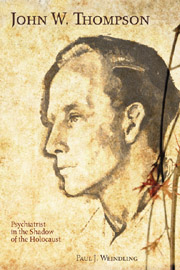Book contents
- Frontmatter
- Contents
- List of Illustrations
- Acknowledgments
- List of Abbreviations
- Part One Into the Dark
- 1 “Ecce Homo”
- 2 Mexican Childhood
- 3 Palo Alto Schooling, Stanford Student
- 4 Transatlantic Physiologist
- 5 Edinburgh Physician
- 6 Excitable Harvard
- 7 High Altitude and Rapid Descent
- 8 Auden, Anxiety, and the German Mind
- Part Two Redemption
- Part Three Aftermath
- Appendix John Thompson's Writings
- Notes
- Sources
- Index
6 - Excitable Harvard
from Part One - Into the Dark
Published online by Cambridge University Press: 12 September 2012
- Frontmatter
- Contents
- List of Illustrations
- Acknowledgments
- List of Abbreviations
- Part One Into the Dark
- 1 “Ecce Homo”
- 2 Mexican Childhood
- 3 Palo Alto Schooling, Stanford Student
- 4 Transatlantic Physiologist
- 5 Edinburgh Physician
- 6 Excitable Harvard
- 7 High Altitude and Rapid Descent
- 8 Auden, Anxiety, and the German Mind
- Part Two Redemption
- Part Three Aftermath
- Appendix John Thompson's Writings
- Notes
- Sources
- Index
Summary
Emotional Science
“I feel that years ago I got off the rails and am finding it rough going on a self-made road.” Thompson returned to the United States in late 1936. He had the option of returning after a year to Edinburgh or London and specializing in neurology or psychiatry, or extending his stay at Harvard and developing his career as a neurophysiologist.
Everything appeared set for an outstanding medical career at a moment when physiology challenged psychology: “There was a halcyon day when health was considered only in relation to physiology. The public being informed of the right number of calories to be ingested, Paradise was predicted. Regrettably paradise did not ensue. Then there grew the realisation that health, in some ill defined way was a function not only of physiology but of psychology as well. The impetus given to this realization by such workers as Freud and Jung cannot be overestimated. Healthy emotions became the talk of the day.”
Enter the young Dr. John Thompson. At Harvard, he became fascinated by the physiological basis of “healthy emotions” and personality. Could the insights of Freud and Jung find a basis in the physiological sciences? How did emotional expression affect nerves and muscles? Was there a physiology of success and happiness, or a physiology of mental disorder? These questions were the focus of a large-scale research project involving hundreds of “superior” and “well-adapted” Harvard male students.
- Type
- Chapter
- Information
- John W. ThompsonPsychiatrist in the Shadow of the Holocaust, pp. 43 - 62Publisher: Boydell & BrewerPrint publication year: 2010

